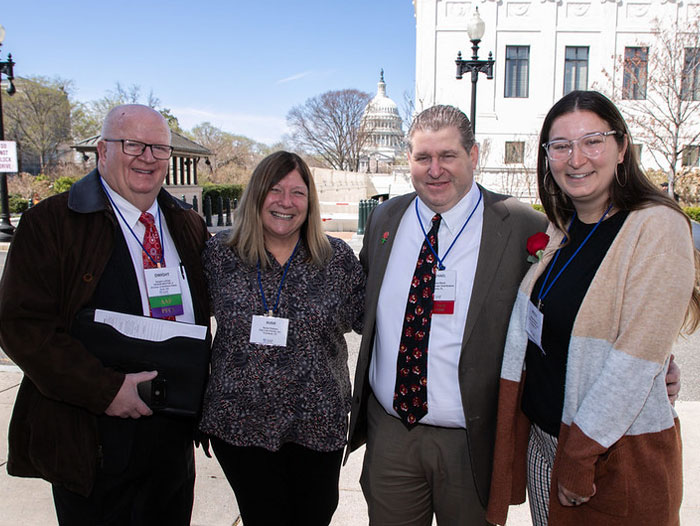Floral Pros Gather in D.C. for SAF’s 42nd Annual Congressional Action Days
April 6, 2022 | 3 min to read

Alexandria, VA – Nearly 70 members of Congress and their staffs heard from floral professionals in Washington D.C. on March 29 about the industry’s need for agricultural labor reform, access to duty-free product, and more funds for cutting-edge floriculture research.
Growers, wholesalers, retail florists and others with ties to the industry met virtually and in person with legislators and their staffs during the Society of American Florists’ 42nd annual Congressional Action Days.
“By coming together and having conversation, we make a difference,” said SAF President Michelle Castellano Keeler, AAF. “Legislators don’t know the flower industry. Every office we visit amplifies the industry’s voice on the Hill.”
The floral industry took to the Hill and specifically asked members of Congress to reauthorize the Generalized System of Preferences, which removes tariffs from certain imports — including roses; reform the H-2A visa program to make it more workable, providing a reliable, legal source of labor; and allocate an additional $2 million to the Floriculture and Nursery Research Initiative.
Floral professionals bolstered their messages to lawmakers by pointing out that other industries also stand to benefit from their requests.
The messages hit home with representatives and their aides, including New Jersey Senator Corey Booker’s office, which has been particularly interested in issues related to agriculture since Booker joined the Senate Agriculture Committee last year.
During a meeting with Booker’s office, SAF Chairperson Chris Drummond, AAF, PFCI, of Penny’s by Plaza Flowers in Philadelphia, explained that each of the issues he presented has a trickle-down effect in the floral industry.
“As a retailer, I want to get the best products,” Drummond told a legislative aide. “I want the best assortments for my customers, grown in sustainable ways. When we talk about ag labor issues, we are on the receiving side. If farms are successful, we are successful.”
Drummond explained how flower growers are hurt when they don’t have the workforce to harvest their crops, and how that labor shortage ultimately affects florists and consumers.
He also urged Booker’s office to take action on reauthorizing the GSP, which would remove a 6.8 percent tariff on Ecuadorian roses. And, when Drummond requested an additional $2 million for the Floriculture Nursery Research Initiative (FNRI), he touted recent “smart-spray” research stemming from FNRI that helped not just the floral industry, but other agriculture sectors.
Those issues were carried to congressional offices over and over Tuesday, giving the industry a unified voice. Attendees were first coached on how to talk about the issues with legislators — including role-playing exercises — by SAF lobbyists Joe Bischoff and Allie Locke.
During a grassroots breakfast presentation, attendees also heard from Rep. Dan Kildee (D-Michigan), who as a young man worked at a Flint, Michigan floral shop. Kildee thanked the participants for making the time to be in the nation’s capital, saying legislators have been out of touch with their constituents because of the pandemic “The only way [this] process works is by doing what you are doing here now…What you are doing is fundamental to the democratic society.”
Many attendees expressed surprise at how eager lawmakers and their staff were to learn more about the floral industry, and as David Boulton, AAF, PFCI, of Flowers By George in Arlington, Washington pointed out, attendees left D.C. with new connections. “It’s about building relationships,” he says.
About The Society of American Florists
The Society of American Florists is the association that connects and cultivates a thriving floral community through training, education, marketing resources and advocacy. Our vision: The power of flowers in every life. For more information, visit SAFnow.org.
